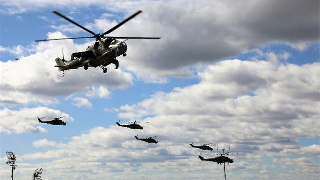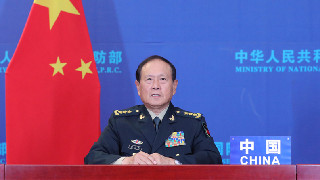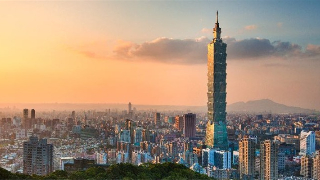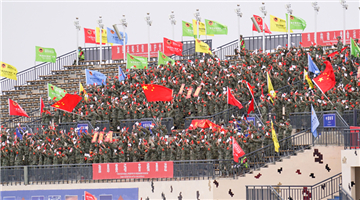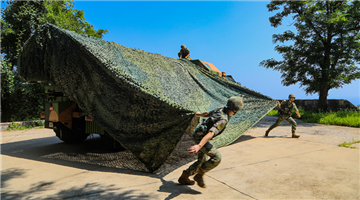By Wu Minwen
On August 8, during his visit to Africa, US Secretary of State Antony Blinken delivered a speech on the Biden Administration’s Sub-Saharan Africa Strategy in South Africa, stating that African countries are “vital partners” of the US, and it is willing to realize the democratic promise with the cooperative partners in Africa together so as to elevate the status of Africa in shaping a shared future.
At present, the Russia-Ukraine conflict has been ongoing, and the US-led NATO and European allies fully supported Ukraine against Russia; the US "Indo-Pacific strategy" to contain China’s rise has also taken up much energy from the US. So Africa has never been a strategic focus of the US. However, Africa is rich in resources and has an enormous population, showing respectable economic growth and development prospects in recent years, which makes it an indispensable part of America’s global strategy.
Military deployment
In 2007, the US Africa Command was established, which is specifically responsible for the US military missions in Africa. Successive administrations of the United States have continuously strengthened their military presence in African countries on the grounds of counter-terrorism, peacekeeping, and strengthening military cooperation with regional countries, etc.
At present, the US has deployed a total of over 60 military bases of diverse sizes and types in Africa. Among others, Camp Lemonier in Djibouti, as the largest base of the US military in Africa, maintains a garrison of around 4,000 all year round, including personnel from the US Army, Navy, Air Force and Marine Corps, and is equipped with F-15 fighter jets, P-3 Orion patrol and anti-submarine warfare (ASW) aircraft, as well as multi-model helicopters and transport aircraft. Capable of performing tasks such as reconnaissance, surveillance, intelligence collection and special operations support, the base has been an important hub for the US military to carry out counter-terrorism and other military missions in the Horn of Africa and the Arabian Peninsula. In addition, the US military has deployed the Security Forces Assistance Brigade (SFAB) at Camp Lemonnier in Djibouti for many years to train relevant forces for some countries in the region, so as to achieve US intervention in regional affairs.
Now the US has to strengthen its military deployment in Europe to support Ukraine against Russia and meanwhile intensify its strength in the Asia-Pacific region to implement its "Indo-Pacific strategy" to contain China’s rise. The US may face the dilemma of military strength insufficiency. To this end, the US military has planned to achieve its military goals in Africa by strengthening military ties with regional countries.
In April this year, the US Africa Command announced that it would open an Office of Security Cooperation at the US Embassy in Zambia, aiming at strengthening military ties between the US and Zambia and expanding cooperation with the Zambian military in military management and vocational military education. In addition, US President Joe Biden has signed an order to deploy about 500 US troops to Somalia, East Africa to restore the US military presence there.
In order to maximize its interests in Africa, the US has strongly excluded other countries from getting involved in African affairs and curbed their influence in Africa. In April this year, the US House of Representatives passed the Countering Malign Russian Activities in Africa Act to counter Russian activities in Africa. The Biden administration has also criticized, excluded and suppressed the activities of other countries in Africa through the Strategic Competition Act of 2021 and the United States Innovation and Competition Act of 2021.
Possible effects
The US has put forward two major demands in its new strategy on Africa: “ensuring the region remains open and accessible to all” and “delivering democratic and security dividends”. But those understanding American verbal tricks and its global strategy can easily decipher the implication of the new US Africa strategy, that is, to ensure that Africa is fully open to the US to exclude other countries from getting involved in or having a say in African affairs, and to secure the US military superiority and security interests in Africa.
Blinken’s trip to Africa, where declaring the US Africa strategy, vigorously demonstrated the US’ strategic intention to promote the so-called “good governance” and human rights in Africa. In essence, actually, it aimed to force some countries to move closer to the US strategic interests according to its ow strategic needs under its political philosophy of the Cold War mentality and ideology confrontation, while excluding and interfering in other countries’ diplomatic space and two-way exchanges in Africa, making Africa an important part of the US’“great-power competition” strategy.
Although Africa is rich in resources with excellent natural conditions, the countries in this region are in extremely unbalanced development, leading to great difficulty in internal unity and coordination. The US Africa strategy will inevitably make the regional relationship even more complex and fragile.
In recent years, the US has faced multiple challenges such as stagnant economic development, internal political divisions, and intensified racial and ethnic conflicts. In terms of external strategy, it has faced acute conflicts between sharply increasing demand for intervention and a great shortage of strategic resources. Under these conditions, commitments of the US to Africa may only turn out to be a lip service.
At the same time, the US demanding regional countries to take sides also serves to deteriorate the regional situation. Ambassador Linda Thomas-Greenfield, the US Permanent Representative to the United Nations, said that up to 75% of Africa’s wheat has been imported from Russia and Ukraine, so the Russia-Ukraine conflict may lead to the worst food crisis in African history. She seriously warned (African) countries not to cooperate with countries sanctioned by the US. The US practice of playing clique trick only for its own interests is bound to make it more difficult for regional countries to coordinate and cooperate, and then worsen the regional security situation.
In the past few decades, the Kosovo war, the war in Afghanistan, and the war in Iraq launched by the US, as well as the Arab Spring initiated and joined by the US, have not only led to nightmares for the countries and people in these regions but also made the US itself fall into embarrassment. The US Africa strategy is of strong potential for “great-power competition” and Cold War mentality. African countries must be very scrupulous in terms of the willingness to join or the depth of involvement.
(The author is from School of Information and Communication, National University of Defense Technology)
Editor's note: This article is originally published on zqb.cyol.com, and is translated from Chinese into English and edited by the China Military Online. The information, ideas or opinions appearing in this article do not necessarily reflect the views of eng.chinamil.com.cn.
